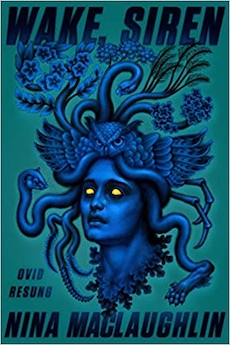By Indira Ganesan
You will open Nina MacLaughlin’s (ΦBK, University of Pennsylvania) rapturous, incendiary Wake Siren, and read six, ten, sixteen stories without stopping. Here are the names you know, and stories you thought you knew: Daphne, turned into a laurel tree; Arachne, turned into a spider; Echo; Io; Sibyl. Some of the stories you have recently read in other modern retellings, like Scylla’s, in Madeline Miller’s Circe, but this one in Wake, Siren, in seventeen, swift pages, contains emails, girls talking while one brushes another’s hair, full of the hesitations and self-blame young women infuse their lives with, and, perhaps in a nod to Richard Brautigan, the word mayonnaise. It is like all of the mythological lives retold and indeed, resung by MacLaughlin from Ovid’s The Metamorphoses: vivid, sharp, clear; painful, and riveting. You continue, and almost cannot, cannot read, but you must, must read, the story of Philomena, who was a child, turned into a nightingale, told by her sister Procne who became a swallow, and the insidious horror done to them by one man. As you continue to read Wake, Siren, maybe in bursts, maybe all at once, you will become convinced of what a genius is Nina MacLaughlin.
This was my experience in reading Wake, Siren. Not all the stories are about rape, but most of them are. Some are also stories about not knowing the harm one does in daily life, in not knowing the stories each blade of grass can contain. She writes that the stories came to her rapidly, first as an exercise “to write a story in [Callisto’s] voice, moving through Allen Mandelbaum’s translation of Ovid nearly twelve-thousand-line poem, depicting over two hundred tales of transformation.” Here are the stories of the women forced against their will by the Greco-Roman gods, half-gods, monsters, and men. MacLaughlin retells almost all of them mostly in the voice of the woman who experienced the rape, recounting the surprise, the fear, the violence, sense of betrayal., and the aftermath. And though the actors are ancient, we know their names could be contemporary. We have seen the trials of women who have been raped, the laughter and mockery spewing forth from of the accused, the hostile, contemptuous scrutiny faced by the women as if it were they who are on trial, the rewards given to the accused, the wealth, the honors, the laurels. We see how a man accused of rape becomes the very one who will later judge future rapists. As ordinary, intelligent women and men, we watch the proceedings, and read the paper, and open our eyes rape culture. These men in power must know their Greek myths; these men have read Latin in their schooling. And if the inevitable fate attending hubris escaped them, the boys club did not. If Jove could rape a girl, turn her into a cow to deceive his wife, why couldn’t any man do the same, and get pats on the back for it? Boys will be boys, we hear; fifteen minutes of horseplay doesn’t deserve prison sentences. Oh, reader, of course it does.
But sometimes acts of faith and generosity are rewarded, and even women are treated right. Remember the old couple who lovingly feed tired strangers with the poverty of their meagre provisions, not knowing they were gods? That section soothes like a balm. We see that some gods, well, the same gods, these gods who have so many other lives, are capable of kindness. And some of the stories are told by friends, by sisters, by brothers. Everyone has been affected. Well, I don’t know if the rapists will read this book, but everyone should. Really, everyone should. Nina MacLaughlin has written an amazingly good book, a stellar book, a book whose time has come. Nina MacLaughlin’s excellent Wake, Siren evokes tears in me, still.
Novelist Indira Ganesan was inducted into Phi Beta Kappa at Vassar College in 1982. Her books include The Journey (Alfred A. Knopf, 1990), Inheritance (Alfred A. Knopf, 1998) and As Sweet As Honey (Alfred A. Knopf, 2013).




